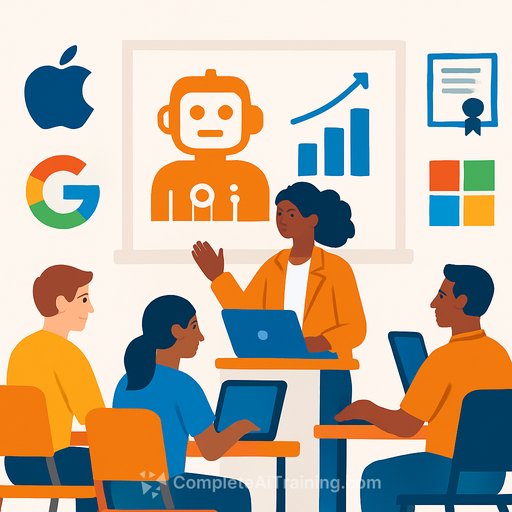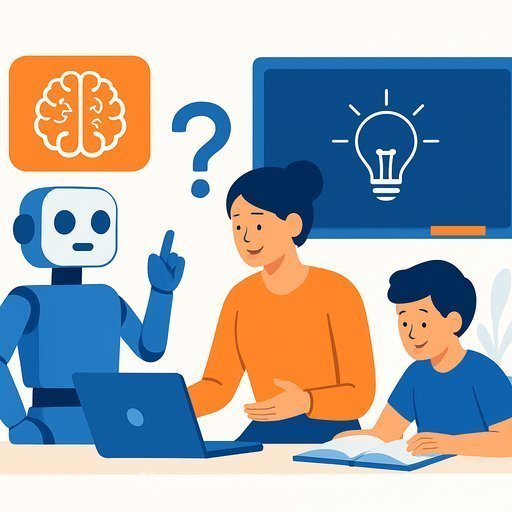AI Training Initiatives in California’s Education System
California’s education system is stepping up to prepare students for an economy transformed by artificial intelligence. Major tech companies like Google, Microsoft, Adobe, and IBM are partnering with state schools and universities to provide free AI-related tools and training.
As AI starts to replace many entry-level jobs, the state’s universities and community colleges offer a promising path: education programs focused on AI skills that are becoming essential in the workforce.
State and Tech Collaboration
Governor Gavin Newsom highlighted the changing job market during a press conference at Google’s San Francisco office, noting recent layoffs at Microsoft, Alphabet (Google’s parent company), and Salesforce. These events underscore the urgent need for new training opportunities.
In response, California’s community colleges and California State University campuses—the backbone of workforce development—have signed agreements with tech giants to roll out AI training resources. These partnerships not only provide free tools but also give companies access to millions of potential new users.
History and Recent Developments
The push for AI integration in schools gained momentum after OpenAI released ChatGPT in November 2022. Since then, districts like Los Angeles Unified and San Diego Unified have experimented with AI tools, though not without challenges. For example, Los Angeles Unified canceled its AI chatbot program after three months without explanation, and San Diego Unified faced controversy over AI-assisted grading software used without full board awareness.
Additionally, Canvas, a widely used learning management system in California, plans to add AI-driven interactive features similar to ChatGPT.
Challenges and Mixed Signals
Many K-12 and college districts are combating AI-related cheating by using Turnitin’s AI detection software. However, investigations have found this software sometimes flags original student work as plagiarized, causing frustration among educators.
Stephanie Goldman, executive director of the Faculty Association of California Community Colleges, points out the conflicting message: districts invest heavily in AI detection while simultaneously adopting AI tools for learning.
Don Daves-Rougeaux, senior adviser for the community college system, acknowledges this tension but sees it as part of adapting to fast AI developments. The system plans to regularly review the use of Turnitin and other AI resources.
Community Colleges: A Critical Role
California’s 116 community colleges serve about 2.1 million students and provide most of the state’s job training, despite receiving the lowest per-student funding. The new AI partnerships will bring exclusive access to Google’s AI tools like Gemini and Notebook LLM, which promise significant cost savings for these colleges.
Faculty members are concerned about maintaining control over AI’s role in classrooms, especially when students are still developing critical thinking skills. Balancing AI integration with effective teaching remains a key challenge.
Broader Tech Partnerships Across Education Levels
The K-12 system and California State University system are also working on AI initiatives with major tech companies like Amazon Web Services, Intel, LinkedIn, and OpenAI, in addition to Google, Microsoft, Adobe, and IBM.
Adobe’s partnership with California high schools focuses on promoting "AI literacy," helping students and teachers gain foundational skills in identifying and using AI tools. However, individual K-12 districts must approve participation in these programs.
Effectiveness and Future Outlook
Experts caution that it’s still unclear how effective AI training programs will be. Justin Reich, an MIT associate professor, compares the current AI push to the early 2000s focus on computer literacy, noting that the education sector is still figuring out what "AI literacy" really means.
He also warns that the promises tech companies make about saving teachers time often fall short, and schools are already stretched thin.
On the other hand, Erin Mote, CEO of InnovateEDU, stresses the need for action. With many traditional career paths disappearing, educators must adapt and provide students with relevant AI skills now rather than waiting.
Earlier, California Community Colleges partnered with NVIDIA to offer AI training similar to the new deals with Google and others. However, data about the program’s impact remains limited due to the small number of participants so far.
Resources for Educators
For educators seeking practical AI training resources, platforms like Complete AI Training offer a range of courses on AI tools, prompt engineering, automation, and certification programs tailored for education professionals.
These resources can help educators gain confidence in integrating AI effectively while supporting students’ development of critical skills.
Your membership also unlocks:






